Loop of Lac Blanc
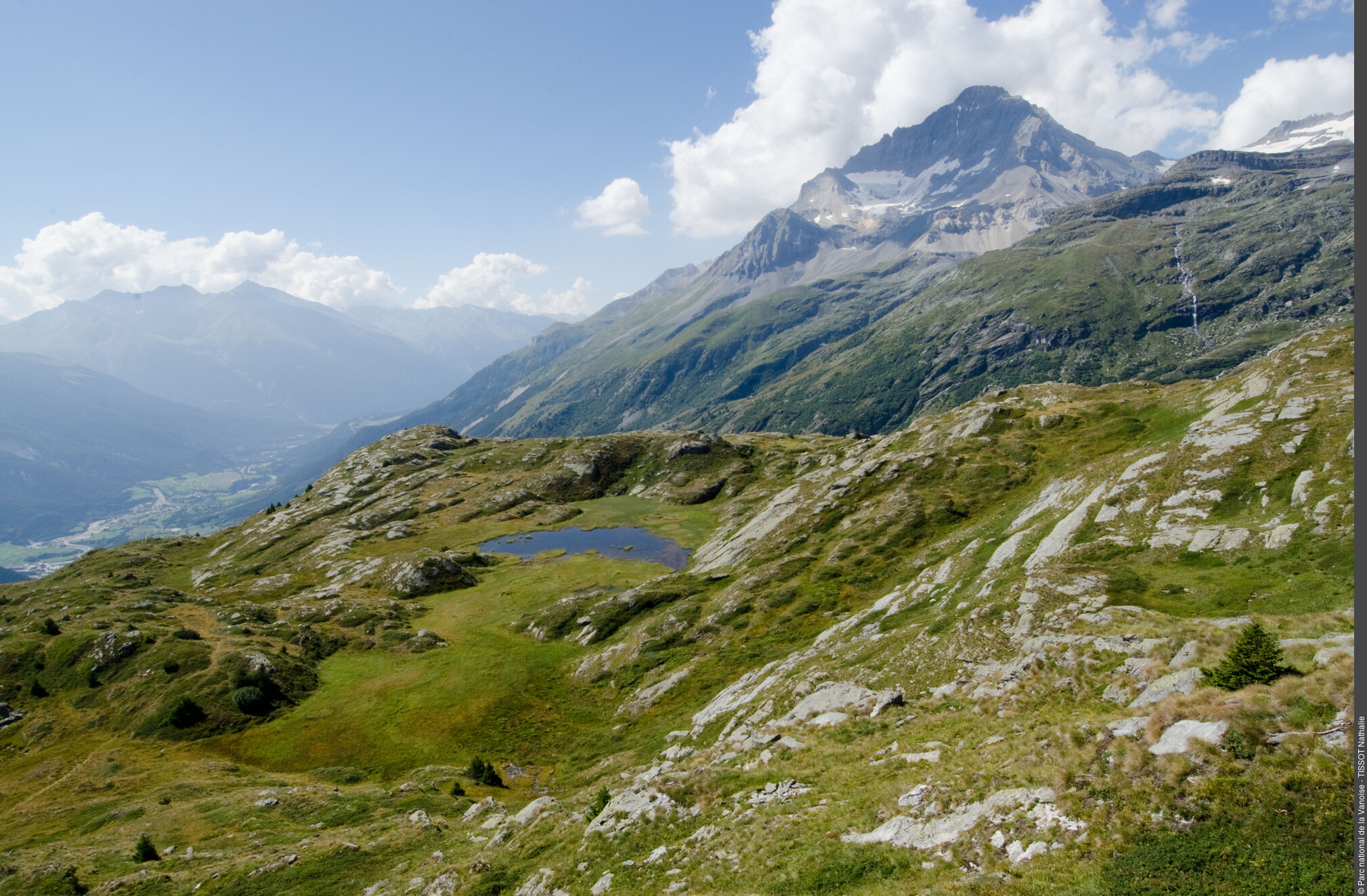
VAL-CENIS
Loop of Lac Blanc
Very easy
4h
13km
+617m
-622m
Loop
Embed this item to access it offline
Clear skies, beautiful morning. The trail on the slope rises gently towards Lac Blanc, the resounding and rhythmic song of the partridges accompanying me. Once at the lake, I sit down. The magic of the first rays of the sun will soon shine on the summit of the Parrachée. Its artful face is revealed little by little. I’ll have to wait a while for the sun to warm my back but everything is set and the day can start! Laurent Perier-Muzet, Vanoise National Park ranger
Description
From Coétet car park, take the trail in the direction of Lac Blanc walking alongside the slope. Once you arrive at Lac Blanc, you can either walk around it (in about 1/2 hour), or to go directly to the Refuge du Lac Blanc to take the track to the Bellecombe car park. Then follow the signs to the hamlet of Chavière. The path descends gently to the Coêtet car park.
- Departure : Coêtet car park, Termignon
- Arrival : Coêtet car park, Termignon
- Towns crossed : VAL-CENIS
Forecast
Altimetric profile
Sensitive areas
Along your trek, you will go through sensitive areas related to the presence of a specific species or environment. In these areas, an appropriate behaviour allows to contribute to their preservation. For detailed information, specific forms are accessible for each area.
Bearded vulture
- Impacted practices:
- Aerial, , Land, Vertical
- Sensitivity periods:
- JanFebMarAprMayJunJulAugNovDec
- Contact:
Recommandations
Don’t leave the path
Is in the midst of the park
The national park is an unrestricted natural area but subjected to regulations which must be known by all visitors.
Information desks
Maison de la Vanoise, Place de la Vanoise, Termignon, 73500 Val-Cenis
Vanoise Information Desk - Termignon
Place Vanoise, 73500 Termignon
Transport
"
Rail connection to Modane. Information: www.voyages-sncf.com
Then transport by coach to the administrative centre of Termignon. Information: www.transavoie.com
Then free shuttle bus Termignon-Bellecombe, from July to August and the weekends from 15th June to 14th September.
Shuttle bus information: www.termignon.haute-maurienne-vanoise.com/pratique/se-deplacer-sans-voiture
(Possibility to walk to Lac Blanc from Bellecombe car park).
Suggested hitchhiking organised in the Haute-Maurienne valley. Information: www.rezopouce.fr
"Access and parking
From the Maison de la Vanoise to Termignon, take the D 1006 to the top of the valley. In the first hairpin bend on the right, take the D 126 on the left towards Bellecombe car park. Stop 9 km further up at the Coétet car park.
Parking :
Coêtet car park, Termignon
Accessibility
The trail is not adapted
- Emergency number :
- 114
More information
6 points of interest
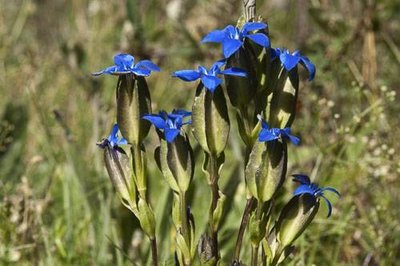
Gentiane à calice renflé. - PNV - AUGÉ Vincent  Flora
FloraGentiana utriculosa
This small deep blue flower favours the light and nutrient-poor soil. It is therefore most likely to be seen at the bends of the trail...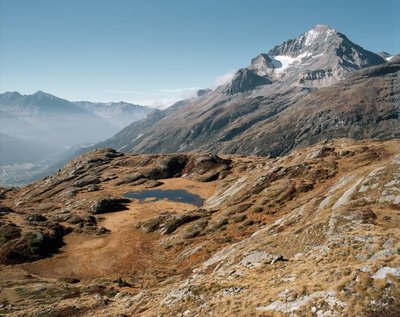
Vue sur le lac du Lait (2006) - PNV - Beatrix Von Conta  Lake
LakeView over Lac du Lait
A high-altitude lake surmounted by a summit. Classic mountain landscape shaped by glaciers. To the right of the photograph is the glacier of Belle Place which left its traces as it descended from the eastern side of the Dent Parrachée. A glacier which has now reduced to a few metres in thickness. The last great ice age of the Würm covered the entire Vanoise and descended from Mont Blanc to Lyons. It is therefore difficult to establish the exact origins of Lac du Lait. But its age is certain: the lake is precisely 12,000 years old, as established by analysing the pollen taken from peat. What we have here is the only real peat bog currently known in the heart of the Vanoise National Park. It draws another part of its originality from its exceptionally high altitude for this type of environment. At more than 2,200 metres, the basin dug out by ice was filled with water after their retreat and a wetland was created. This has now closed imperceptibly, filled with vegetation that eliminates the water. It is, in some way, the last stage of this lake’s evolution, the twilight of its life.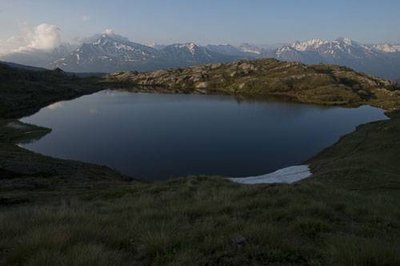
Le Lac Blanc, Termignon. - PNV - BUCZEK Jessica  Lake
LakeLac Blanc
This lake, due to the highly impermeable bedrock, is mainly fed by runoff water. It cascades in to the Doron gorges 400 metres below. As you approach the shore, you may be lucky enough to see a bearded vulture, the largest of the European birds of prey. A couple nest in these gorges, a little further upstream. Get the binoculars out!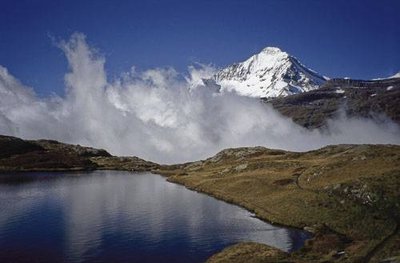
Le Lac Blanc, avec vue sur la Dent Parrachée. - PNV - GROSSET Félix  Summit
SummitThe Dent Parrachée
The east face of the second summit of Vanoise (3,697 m in altitude) stands before you. It inspires mountaineers every year to climb it to enjoy one of the most stunning views of the Alps. Unfortunately, the ascent has also had its fair share of tragic accidents reminding us that man must remain humble in the face of nature. All paths have their difficulties in climbing, including the route classified as least difficult but it dœs follow a very beautiful, snowy and sometimes airy rocky ridge.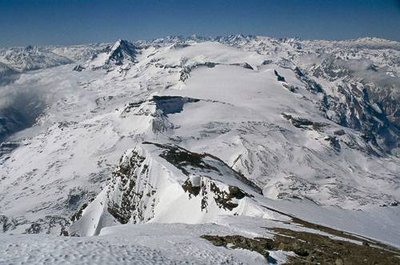
Chaîne de montagnes, dont les Glaciers de la Vanoise. - PNV - GOTTI Christophe  Glacier
GlacierThe Vanoise Glaciers
Stretching to the north of the Dent Parrachée are the Vanoise glaciers, formed across 13 km by multiple domes which include Génépy, Arpont, Nants, Chasseforêt and Sonnailles. The crossing of the Vanoise glaciers is renowned for its beauty and the panoramic view it offers! Above 3,000 m, much of the precipitation is in the form of snow. The accumulating snow is packed and transformed from a light layer with a density of less than 100 g per litre, which then turns to a hard compact snow cover that, when it dœsn’t melt in summer, turns into névé which becomes five times denser. If, after years of accumulation, the névé persists, the snow hardens again, pressing out all trapped air to become bright, transparent ice with a density of 900 g per litre.
 Refuge
RefugeRefuge du Lac Blanc
Need a stop? The Refuge du Lac Blanc welcomes you for a drink and dessert. Try their delicious small dishes or their homemade blueberry pie. If you feel compelled to prolong your mountain break, stay the night and enjoy the great spectacle before falling asleep and wake up to the Parrachée.
